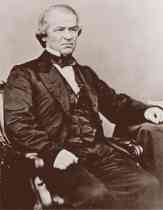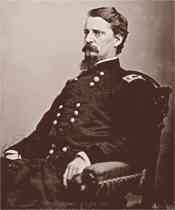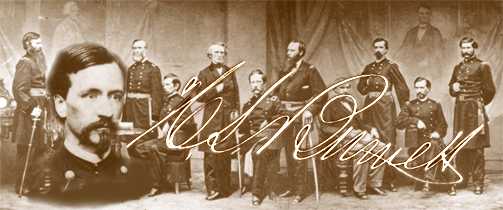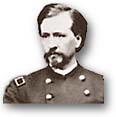GEN. HANCOCK'S REPUTATION
General Hancock was especially denounced because he was obedient to the order of the President -- the
Commander-in-Chief of the Army under the Constitution -- and had failed to deliver Mrs Surratt over to
 the custody of the Court under the habeas corpus proceedings. His rivals and enemies made
most unscrupulous use of this weapon against him as soon as he became prominently talked of as democratic
candidate for President in 1880.
the custody of the Court under the habeas corpus proceedings. His rivals and enemies made
most unscrupulous use of this weapon against him as soon as he became prominently talked of as democratic
candidate for President in 1880.
In 1871, one of the leading papers of St. Louis said, "Quite a number of the Federal officers, dissatisfied
with the political character and partisan purposes of the late war, resigned their positions in the army at one
time or antoher. Some of them felt that the 'Union' had somehow come to be a secondary consideration in the fight:
others, that it was a merely partisan struggle for the ascendency: but General Hancock, the favorite
 of a few Western Democrats as a candidate for President, seems to have detected none of these
objections. He did his duty like a stolid serving-man through the war. When at New Orleans, he issued
an order that made his great capital among the Southern people; and, when at the North, he distinguished
himself equally as a Federal zealot.
of a few Western Democrats as a candidate for President, seems to have detected none of these
objections. He did his duty like a stolid serving-man through the war. When at New Orleans, he issued
an order that made his great capital among the Southern people; and, when at the North, he distinguished
himself equally as a Federal zealot.
"It was General Hancock, then in command of the Middle Military Division of Washington, who declined to
interfere with the order of the court-martial sentencing Mrs Surratt to death. It was he who became
party to one of the most inhuman crimes ever perpetrated in the name of justice."
This sort of criticism and abuse embittered many an hour of General Hancock's life up to the day of his
death. General Hancock, as we all know who knew him well, in his personal relations with his fellow-men
was as kindly and gentle as a child; was a man with the highest ideals and rules of conduct, and as a soldier
was as brave and knightly as ever buckled sword.
Of a peculiarly proud and sensitive disposition, any word which assailed either his personal honor or
his record as a soldier tortured him like a festering wound.
He talked with me several times about these attacks which had been made upon him, and in 1873 I determined
to write an article reviewing some of the incidents of the trial of the assassins and General Hancock's
relation to it. This purpose I made known to him; and he then informed me that an article had been
prepared by some friend of his upon the subject, and if I wished he would have it sent to me, and I could make such
use of it in the preparation of my article as I wished. It was subsequently sent to me, and I still
have it in my possession. About the same time I received from him the following note:
 New York, October 1, 1873
New York, October 1, 1873
My dear General:
General Mitchell has the paper I spoke to you of. It reached me this A.M. If you will notify
General M. (W.G. Mitchell) where to send it and when, he will send it by messenger to you.
The latter part of the paper contains the matter I particularly desire you to see, although it might be
well for you to read the whole. You are at liberty to use any part of it verbatim ornil. It was not
printed. I should be pleased if you would preserve the paper for me.
I leave for St. Louis this P.M. The only true plan is to meet and crush out this Surratt matter, not to
"dally it" -- as this paper, for example. It is about my idea of meeting the question.
 Yours truly,
Yours truly,
 Winfield S. Hancock
Winfield S. Hancock
To General Burnett, N.Y.












 Copyright © 1998, Mary S. Van Deusen
Copyright © 1998, Mary S. Van Deusen